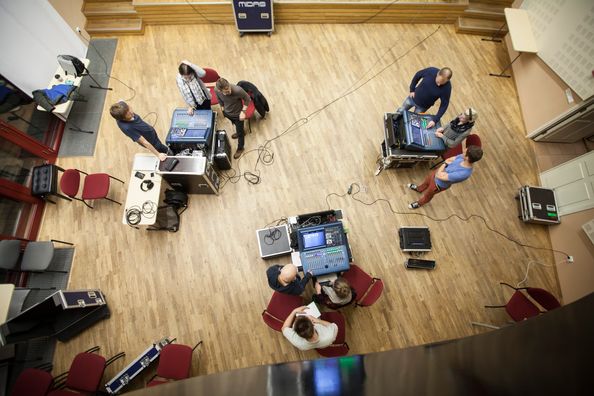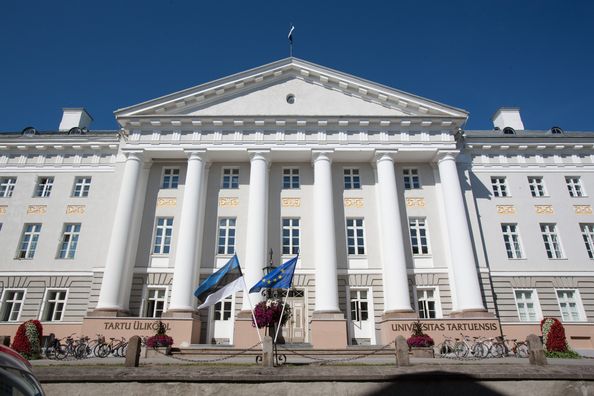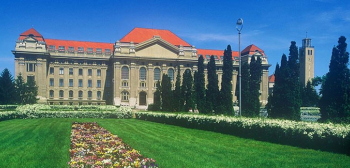- #=362 QS Global World Ranking
- PublicStatus
- Very HighResearch Output
- 11,669Total Students
- 2,002Faculty
- 1,198Int'l Students
The University’s position in the current QS World University Rankings.
Whether the University is funded by the government of that country or state, or funded by private donations.
The research intensity of the University, based on the number of papers output relative to the University’s size.
The number of full time equivalent students enrolled at the University.
The number of full time equivalent teaching staff employed by the University.
The number of full time equivalent international students enrolled at the University.
University of Tartu



















































































About
University of Tartu offers 23 master’s degree programmes fully taught in English and 1 master’s degree programme that is taught in Russian. The duration of master’s studies is 1-2 years. The subjects include such fields as philosophy, semiotics, folkoristics, languages, education, international relations, political science, regional studies, law, economics, business management, finances, chemistry, measurement, engineering, robotics, geoinformatics, computer science, bioengineering, materials science and technology, contemporary Asian and Middle Eastern studies, sound and visual technology.
The general requirements for master’s studies:
- Bachelor's degree or equivalent qualification (or graduating in the upcoming spring/summer) – please see country-specific document requirements here.
- Proof of English language proficiency – please see acceptable tests and exempt categories here.
The following master’s degreed programmes are offered:
- Actuarial and Financial Engineering – tuition fee 5,000 euros per year;
- Applied Measurement Science – tuition fee 5,000 euros per year;
- Bioengineering – tuition fee 5000 euros per year;
- Computer Science – tuition fee 6,000 euros per year;
- Contemporary Asian and Middle Eastern Studies – tuition fee 3,800 euros per year;
- Politics and Governance in Digital Age – tuition fee 3,800 euros per year;
- Educational Technology – tuition fee 3,800 euros per year;
- European Languages and Cultures – tuition fee 4,000 euros per year;
- Excellence in Analytical Chemistry – tuition fee for programme countries (28 EU countries, Norway, Lichtenstein, Turkey, Iceland, Former Yugoslav Republic of Macedonia) – 4,500 euros per year, other countries – 9000 euros per year;
- Folkloristics and Applied Heritage Studies – tuition fee 4,000 euros per year;
- Geoinformatics for Urbanised Society – tuition fee 5,000 euros per year;
- Information Technology Law – tuition fee 3,800 euros per year;
- Innovation and Technology Management – tuition fee 3,800 euros per year;
- International Law and Human Rights – tuition fee 3,800 euros per year;
- International Relations and Regional Studies – tuition fee 3,800 euros per year;
- Material Science and Technology – tuition fee 5,000 euros per year;
- Philosophy – tuition fee 4,000 euros per year;
- Quantitative Economics – tuition fee 3,800 euros per year;
- Robotics and Computer Engineering – tuition fee 5,000 euros per year;
- Semiotics – tuition fee 4,000 euros per year;
- Sound and Visual Technology – tuition fee 4,000 euros per year;
- Software Engineering – tuition fee 6,000 euros per year;
- Wellness and Spa Service Design and Management – tuition fee 3,800 euros per year;
- Teaching Russian as a Foreign Language – tuition fee 3,800 euros per year.
Almost every master’s programme (except for Teaching Russian as a Foreign Language, International Law and Human Rights and Contemporary Asian and Middle Eastern Studies) offers tuition-waiver scholarships for the best applicants based on a ranking admission list. Everybody applying for international master’s studies will be automatically considered for the scholarship, thus there is no need to apply for it separately. There are also scholarships for living available for master’s students: Dora Plus and Ministry of Foreign Affairs scholarships for certain programmes. See more about scholarships here.
The application process is conducted online. Candidates should submit the online application with electronic copies of all the required documents via Estonia.Dreamapply.com. The application deadlines for Excellence in Analytical Chemistry: November 11 - January 11, Contemporary Asian and Middle Eastern Studies: January 2 - March 15 (extended deadline until 30 June for EU/EEA/Swiss citizens) and for all other master's programmes: January 2 - March 15.
UT also offers 35 PhD programmes. The duration of PhD studies is 4 years. There is no tuition fee for all PhD programmes. Students receive doctoral allowance 660 EUR + the doctoral students’ performance stipend 400 EUR.
General eligibility requirements for PhD studies:
- Master's degree or a corresponding level of education.
- Doctoral thesis project/motivation letter (depending on the programme) and an entrance interview.
- All eligible applicants are ranked and ranking is based on the results of entrance examinations and other programme-specific requirements set for a particular PhD curriculum.
- Admission is regulated by the document Admission rules in Doctoral Studies.
- Proof of English language proficiency (there are additional language requirements for some specific PhD programmes).
University of Tartu owns over 100 university buildings that are equipped with advanced study facilities, excellent libraries, state-of-the-art laboratories. Such modern study campuses as “Physicum”, “Chemicum” buildings are among the top research and education facilities in Northern Europe. Since 2020, our students can study at “Delta Centre” - one of the most modern centres of digital technology, mathematics and entrepreneurship in the Nordic region. Our newly renovated library belongs to the biggest libraries in Estonia and includes approximately 3.9 million items and different facilities such as gym, music, individual rooms, cafes etc. There is only one teaching hospital in Estonia that belongs to UT. UT also has 3000-capacity venue for conferences and sport competitions and offers 14 different competitive sports at UT Academic Sports Club. The facilities are not limited to Tartu Observatory – a modern space research centre, Botanical garden with 10000 species of plants, 4 museums: University of Tartu Art Museum, Old Observatory, Natural History Museum, University of Tartu Museum, 10 residence halls, etc.
UT provides a wide range of support services for students. The Admission office provides a support for students in admission-related questions along with faculty departments that assist with organization of a study process. Study abroad center consults students in visa-related issues, health and safety, study abroad opportunities, organises orientation courses, etc. Accommodation office provides housing services for students in our UT dormitories. Counselling center includes career counselling, psychological counselling and counselling students with special needs. There are also Students to Students Services such as tutors, international student ambassadors, buddies, ESN, UT Student Council. For instance, all new students will have a tutor, the student who will guide them throughout the settlement process or ask questions from international ambassadors about life in Estonia and studies at UT. The level of satisfaction with support services at UT among international students is 93.5% (I-Graduate ISB 2019).
The University of Tartu is the biggest university in Estonia: there are 13000 students studying here. UT is truly diverse and brings together 1 600 international students (12%), coming from 100 countries all over the world. 97% of our international students would recommend UT for studies (I-Graduate ISB 2019).
UT has numerous student clubs and associations, varying from professional organizations to informal groups based on shared interests (ESN, International Student Ambassadors, sTARTUp Lab, etc.) There are many student events taking place every day in Tartu: concerts, festivals, exhibitions, movie nights, international and cultural days of different countries, sports competitions, etc. During the holidays, students can travel around Estonia and to other European countries since Estonia is a part of the Schengen Area. The university also has a sports complex equipped with gyms and fitness clubs.
UT students are provided with places in comfortable apartment-style dormitories located right in the center of Tartu, 10-15 minutes’ walk from the educational buildings. Two students live in the same room and share the common area. There are WIFI, bike parking, laundry, etc. available at our dormitories. The cost of living in dormitories is up to 150 euros per month, depending on a season. Students can also rent rooms in private accommodations or rent the whole apartment. In this case, the rent will be from 150 to 400 euros. In every campus of UT, there is a university cafeteria, and the city has many restaurants, cafes and cafeterias that offer lunches for students at affordable prices.
Students are admitted once a year in spring, with the academic year beginning on the first week of September. Everyone, regardless their country of origin, who has completed their previous level of education (secondary school for bachelor’s studies, and a bachelor’s degree for master’s studies) can apply for degree programmes at UT. If you graduate later in spring or summer after the application deadline, you can still apply for the programme with your latest grade list or transcript of records from your school.
In order to apply, candidates should submit the online application with electronic copies of all the required documents via Estonia.Dreamapply.com before the deadline. All international applicants are required to pay the application fee EUR 50, unless they have completed the previous study level in Estonia. With one application fee, applicants can apply for two programmes. The admission criteria is different for each certain programme. Find out more here.
The required documents:
- previous education documents with supplements (with official certified translation into English if the document is in other language than English) - see country-specific document requirements here.
- copy of valid international passport page stating the applicant’s personal particulars
- proof of English language proficiency (TOEFL, IELTS, etc.)
- motivation letter
- Skype / portfolio / SAT / etc. depending on each particular study programme
Almost every international degree programme at UT offers tuition-waiver scholarship for the best applicants based on a ranking admission list. Everybody applying for international bachelor’s and master’s studies will be automatically considered for the scholarship, thus there is no need to apply for it separately. Students receiving this scholarship do not have to pay the tuition fee if they complete a full-time study load of 30 ECTS per semester. Additionally, students can apply for the stipends covering the costs of living in Estonia. Find out more here.
Application deadlines
- Bachelor's programmes: January 2- April 15 (there is an extended deadline until 30 June available for EU/EEA/Swiss citizens applying for fee-based study places in the BBA programme).
- Master's programmes: Excellence in Analytical Chemistry: November 11 - January11, Contemporary Asian and Middle Eastern Studies: January 2 - March 15 (extended deadline until 30 June for EU/EEA/Swiss citizens) and for all other master's programmes: January 2 - March 15.
- PhD programmes: May 1- May 15 (there are separate calls for certain programmes throughout the year).
Graduates of the University of Tartu are well-equipped with knowledge and are successful on the work market in Estonia and worldwide. Our alumni run their own successful businesses, work for national or international companies or in public institutions. According to the survey that was conducted in 2019, many of our graduates had a job in their profession already during the studies (Bachelor’s graduates – 54%, Master’s graduates – 67%, Doctoral graduates – 73%), the rest have found their job either in two months after graduation (Bachelor’s graduates – 26%, Master’s graduates – 20%, Doctoral graduates – 13%) or within the period of 2 to 6 months (Bachelor’s graduates – 7%, Master’s graduates – 7%, Doctoral graduates – 6%).
In addition, UT provides career-counselling services that helps students make decisions related to their work and education, plan and develop their career and develop their job searching skills. UT also has a big network of UTalumni. Most of the alumni have agreed to contribute to the university’s activities – by offering traineeship opportunities for students, supervising graduation papers or answering professional questions. In addition, many of them are willing to mentor students. It is easy to find an alumnus of your speciality or field of study to help you. We also have International Student Ambassadors alumni that help prospective students get to know the university and share real experiences of living and studying in Tartu.
About
University of Tartu offers 23 master’s degree programmes fully taught in English and 1 master’s degree programme that is taught in Russian. The duration of master’s studies is 1-2 years. The subjects include such fields as philosophy, semiotics, folkoristics, languages, education, international relations, political science, regional studies, law, economics, business management, finances, chemistry, measurement, engineering, robotics, geoinformatics, computer science, bioengineering, materials science and technology, contemporary Asian and Middle Eastern studies, sound and visual technology.
The general requirements for master’s studies:
- Bachelor's degree or equivalent qualification (or graduating in the upcoming spring/summer) – please see country-specific document requirements here.
- Proof of English language proficiency – please see acceptable tests and exempt categories here.
The following master’s degreed programmes are offered:
- Actuarial and Financial Engineering – tuition fee 5,000 euros per year;
- Applied Measurement Science – tuition fee 5,000 euros per year;
- Bioengineering – tuition fee 5000 euros per year;
- Computer Science – tuition fee 6,000 euros per year;
- Contemporary Asian and Middle Eastern Studies – tuition fee 3,800 euros per year;
- Politics and Governance in Digital Age – tuition fee 3,800 euros per year;
- Educational Technology – tuition fee 3,800 euros per year;
- European Languages and Cultures – tuition fee 4,000 euros per year;
- Excellence in Analytical Chemistry – tuition fee for programme countries (28 EU countries, Norway, Lichtenstein, Turkey, Iceland, Former Yugoslav Republic of Macedonia) – 4,500 euros per year, other countries – 9000 euros per year;
- Folkloristics and Applied Heritage Studies – tuition fee 4,000 euros per year;
- Geoinformatics for Urbanised Society – tuition fee 5,000 euros per year;
- Information Technology Law – tuition fee 3,800 euros per year;
- Innovation and Technology Management – tuition fee 3,800 euros per year;
- International Law and Human Rights – tuition fee 3,800 euros per year;
- International Relations and Regional Studies – tuition fee 3,800 euros per year;
- Material Science and Technology – tuition fee 5,000 euros per year;
- Philosophy – tuition fee 4,000 euros per year;
- Quantitative Economics – tuition fee 3,800 euros per year;
- Robotics and Computer Engineering – tuition fee 5,000 euros per year;
- Semiotics – tuition fee 4,000 euros per year;
- Sound and Visual Technology – tuition fee 4,000 euros per year;
- Software Engineering – tuition fee 6,000 euros per year;
- Wellness and Spa Service Design and Management – tuition fee 3,800 euros per year;
- Teaching Russian as a Foreign Language – tuition fee 3,800 euros per year.
Almost every master’s programme (except for Teaching Russian as a Foreign Language, International Law and Human Rights and Contemporary Asian and Middle Eastern Studies) offers tuition-waiver scholarships for the best applicants based on a ranking admission list. Everybody applying for international master’s studies will be automatically considered for the scholarship, thus there is no need to apply for it separately. There are also scholarships for living available for master’s students: Dora Plus and Ministry of Foreign Affairs scholarships for certain programmes. See more about scholarships here.
The application process is conducted online. Candidates should submit the online application with electronic copies of all the required documents via Estonia.Dreamapply.com. The application deadlines for Excellence in Analytical Chemistry: November 11 - January 11, Contemporary Asian and Middle Eastern Studies: January 2 - March 15 (extended deadline until 30 June for EU/EEA/Swiss citizens) and for all other master's programmes: January 2 - March 15.
UT also offers 35 PhD programmes. The duration of PhD studies is 4 years. There is no tuition fee for all PhD programmes. Students receive doctoral allowance 660 EUR + the doctoral students’ performance stipend 400 EUR.
General eligibility requirements for PhD studies:
- Master's degree or a corresponding level of education.
- Doctoral thesis project/motivation letter (depending on the programme) and an entrance interview.
- All eligible applicants are ranked and ranking is based on the results of entrance examinations and other programme-specific requirements set for a particular PhD curriculum.
- Admission is regulated by the document Admission rules in Doctoral Studies.
- Proof of English language proficiency (there are additional language requirements for some specific PhD programmes).
University of Tartu owns over 100 university buildings that are equipped with advanced study facilities, excellent libraries, state-of-the-art laboratories. Such modern study campuses as “Physicum”, “Chemicum” buildings are among the top research and education facilities in Northern Europe. Since 2020, our students can study at “Delta Centre” - one of the most modern centres of digital technology, mathematics and entrepreneurship in the Nordic region. Our newly renovated library belongs to the biggest libraries in Estonia and includes approximately 3.9 million items and different facilities such as gym, music, individual rooms, cafes etc. There is only one teaching hospital in Estonia that belongs to UT. UT also has 3000-capacity venue for conferences and sport competitions and offers 14 different competitive sports at UT Academic Sports Club. The facilities are not limited to Tartu Observatory – a modern space research centre, Botanical garden with 10000 species of plants, 4 museums: University of Tartu Art Museum, Old Observatory, Natural History Museum, University of Tartu Museum, 10 residence halls, etc.
UT provides a wide range of support services for students. The Admission office provides a support for students in admission-related questions along with faculty departments that assist with organization of a study process. Study abroad center consults students in visa-related issues, health and safety, study abroad opportunities, organises orientation courses, etc. Accommodation office provides housing services for students in our UT dormitories. Counselling center includes career counselling, psychological counselling and counselling students with special needs. There are also Students to Students Services such as tutors, international student ambassadors, buddies, ESN, UT Student Council. For instance, all new students will have a tutor, the student who will guide them throughout the settlement process or ask questions from international ambassadors about life in Estonia and studies at UT. The level of satisfaction with support services at UT among international students is 93.5% (I-Graduate ISB 2019).
The University of Tartu is the biggest university in Estonia: there are 13000 students studying here. UT is truly diverse and brings together 1 600 international students (12%), coming from 100 countries all over the world. 97% of our international students would recommend UT for studies (I-Graduate ISB 2019).
UT has numerous student clubs and associations, varying from professional organizations to informal groups based on shared interests (ESN, International Student Ambassadors, sTARTUp Lab, etc.) There are many student events taking place every day in Tartu: concerts, festivals, exhibitions, movie nights, international and cultural days of different countries, sports competitions, etc. During the holidays, students can travel around Estonia and to other European countries since Estonia is a part of the Schengen Area. The university also has a sports complex equipped with gyms and fitness clubs.
UT students are provided with places in comfortable apartment-style dormitories located right in the center of Tartu, 10-15 minutes’ walk from the educational buildings. Two students live in the same room and share the common area. There are WIFI, bike parking, laundry, etc. available at our dormitories. The cost of living in dormitories is up to 150 euros per month, depending on a season. Students can also rent rooms in private accommodations or rent the whole apartment. In this case, the rent will be from 150 to 400 euros. In every campus of UT, there is a university cafeteria, and the city has many restaurants, cafes and cafeterias that offer lunches for students at affordable prices.
Students are admitted once a year in spring, with the academic year beginning on the first week of September. Everyone, regardless their country of origin, who has completed their previous level of education (secondary school for bachelor’s studies, and a bachelor’s degree for master’s studies) can apply for degree programmes at UT. If you graduate later in spring or summer after the application deadline, you can still apply for the programme with your latest grade list or transcript of records from your school.
In order to apply, candidates should submit the online application with electronic copies of all the required documents via Estonia.Dreamapply.com before the deadline. All international applicants are required to pay the application fee EUR 50, unless they have completed the previous study level in Estonia. With one application fee, applicants can apply for two programmes. The admission criteria is different for each certain programme. Find out more here.
The required documents:
- previous education documents with supplements (with official certified translation into English if the document is in other language than English) - see country-specific document requirements here.
- copy of valid international passport page stating the applicant’s personal particulars
- proof of English language proficiency (TOEFL, IELTS, etc.)
- motivation letter
- Skype / portfolio / SAT / etc. depending on each particular study programme
Almost every international degree programme at UT offers tuition-waiver scholarship for the best applicants based on a ranking admission list. Everybody applying for international bachelor’s and master’s studies will be automatically considered for the scholarship, thus there is no need to apply for it separately. Students receiving this scholarship do not have to pay the tuition fee if they complete a full-time study load of 30 ECTS per semester. Additionally, students can apply for the stipends covering the costs of living in Estonia. Find out more here.
Application deadlines
- Bachelor's programmes: January 2- April 15 (there is an extended deadline until 30 June available for EU/EEA/Swiss citizens applying for fee-based study places in the BBA programme).
- Master's programmes: Excellence in Analytical Chemistry: November 11 - January11, Contemporary Asian and Middle Eastern Studies: January 2 - March 15 (extended deadline until 30 June for EU/EEA/Swiss citizens) and for all other master's programmes: January 2 - March 15.
- PhD programmes: May 1- May 15 (there are separate calls for certain programmes throughout the year).
Graduates of the University of Tartu are well-equipped with knowledge and are successful on the work market in Estonia and worldwide. Our alumni run their own successful businesses, work for national or international companies or in public institutions. According to the survey that was conducted in 2019, many of our graduates had a job in their profession already during the studies (Bachelor’s graduates – 54%, Master’s graduates – 67%, Doctoral graduates – 73%), the rest have found their job either in two months after graduation (Bachelor’s graduates – 26%, Master’s graduates – 20%, Doctoral graduates – 13%) or within the period of 2 to 6 months (Bachelor’s graduates – 7%, Master’s graduates – 7%, Doctoral graduates – 6%).
In addition, UT provides career-counselling services that helps students make decisions related to their work and education, plan and develop their career and develop their job searching skills. UT also has a big network of UTalumni. Most of the alumni have agreed to contribute to the university’s activities – by offering traineeship opportunities for students, supervising graduation papers or answering professional questions. In addition, many of them are willing to mentor students. It is easy to find an alumnus of your speciality or field of study to help you. We also have International Student Ambassadors alumni that help prospective students get to know the university and share real experiences of living and studying in Tartu.
University highlights
- 2012#501- 550
- 2014#461-470
- 2015#=379
- 2016#=400
- 2017#=347
- 2018#=314
- 2019#=321
- 2020#301
- 2021#285
- 2022#=300
- 2023#=296
- 2024#=358
- 2025#358
- 2026#=362
Campus locations
University of Tartu,
Ülikooli 18 , Tartu , Estonia , 50090
School of Law,
Kaarli pst 3 , Tallinn , Estonia , 10119
Pärnu College,
Ringi 35 , Pärnu , Estonia , 80010
Viljandi Culture Academy,
Posti 1 , Viljandi , Estonia , 71004
Narva College,
Raekoja plats 2 , Narva , Estonia , 20307
Related content

Top 10 Universities in Emerg…

Top Universities in Europe

Top Universities in the Worl…

International Scholarships t…

Top 10 Universities in Emerg…

Top Universities in the Worl…

Why You Should Study Medicin…

Top 10 Universities in Emerg…

Lomonosov Moscow State Unive…


